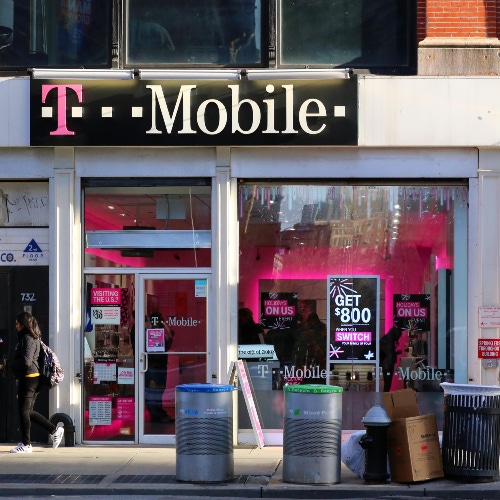
T-Mobile on Thursday made a new "uncarrier" announcement designed to offer customers more pricing options while also taking a stab at the company's rivals. Dubbed "Phone Freedom," T-Mobile said it will offer customers the ability to upgrade to a new phone every two years, rather than the three-year plans that AT&T and Verizon have adopted.
"There's this new phenomenon happening in the industry," Jon Freier, president of T-Mobile's consumer business, told Light Reading. He said AT&T and Verizon have quietly moved their phone payment plans from two-year to three-year contracts.
"I can graduate law school faster than I can get out of these contracts," Freier joked.
The trend has important implications. Indeed, the financial analysts at LightShed Partners said last month that the three-year plans from AT&T and Verizon create "an incremental headwind to new phone sales." Partly as a result of the new plans, the firm lowered its ratings on Apple due to lower-than-expected iPhone sales.
"Ten years ago, we started the 'uncarrier' movement by ridding the industry of two-year service contracts," Mike Sievert, CEO of T-Mobile, said in a release. "A decade after that first 'uncarrier' move, the Carriers [AT&T and Verizon] are still focused on trying to lock customers down."
T-Mobile's first big "uncarrier" media announcement centered on the company's introduction of phone-payment plans, which were subsequently embraced by other network operators. Prior to T-Mobile's move, operators typically offered free phones alongside two- and three-year service contracts – but they did not lower those service prices after recouping the cost of the phones.
Since that announcement roughly 10 years ago, T-Mobile has held almost a dozen more, ranging from free Netflix to improved customer service.
Figure 1:  (Source: Robert K. Chin - Storefronts/Alamy Stock Photo)
(Source: Robert K. Chin - Storefronts/Alamy Stock Photo)
In Thursday's announcement, Freier said T-Mobile will continue to offer phone payment plans that are two years long rather than three. The company will also begin accepting locked devices through its phone trade-in program and will offer a 30-day guarantee for customers who decide not to stay with T-Mobile.
Expanding the rate card
T-Mobile also introduced several new pricing options under its new "Go5G" branding. Importantly, those plans will sit alongside T-Mobile's existing "Magenta"-branded pricing plans.
Freier acknowledged that T-Mobile is "expanding the rate card" with the new plans, but he said the company would be careful not to confuse customers with too many pricing options. He said the operator is working to strike a balance between "choice and confusion" but will tweak its offerings as necessary if customers complain.
T-Mobile's new "Go5G Plus" pricing plan is $5 per month more expensive than its current top-tier "Magenta Max" pricing plan, which goes for around $85 per month for a single line of service. Go5G Plus offers slightly more hotspot data alongside more international data allotments than Magenta Max.
Freier said that 60% of T-Mobile's new customers currently choose its most expensive Magenta Max pricing plan. Thus, he acknowledged that a more expensive option would likely raise T-Mobile's average revenues per account – a figure that's closely watched by Wall Street investors.
"From a business perspective, you'd want us to expand that," Freier said but added that "customers are getting incredible value."
T-Mobile also announced it would reduce prices on its cheapest unlimited plan. The company said its new "Essentials Savings" plan goes for around $50 per month for a single line of service, down from around $60 for its previous "Essentials" plan.
The net result is that T-Mobile now offers more plans across a wider range of prices. The operator's most expensive unlimited plan (now Go5G Plus) costs slightly more than its previous offerings, and its cheapest unlimited plan (now Essential Savings) is a little less expensive than its previous offerings.
Pricing tweaks across the industry
T-Mobile's new "uncarrier" announcement comes roughly a week before the company is expected to report its first quarter earnings results. T-Mobile is widely expected to capture the lion's share of the market's new customers additions.
For example, the financial analysts at TD Cowen recently said they expect T-Mobile to report postpaid phone net customer additions of 527,000 during the period, above AT&T's gain of 409,000 and far above Verizon's expected loss of 272,000.
However, T-Mobile isn't the only operator that's been tweaking its pricing plans. Last year, Verizon announced a new "Welcome Unlimited" service plan that essentially stripped out some digital perks, but also put the company's entry-level pricing on more competitive footing with rivals.
And just this week, Google tweaked its unlimited data pricing by making lines two, three and four each cost $80 per month. The change, according to Cnet, marks a $5 per month increase compared to Google's previous price for three lines. However, Google said it will offer some credits to users.
As detailed in a post by the company, Google also rebranded its T-Mobile MVNO to "Google Fi Wireless" from just "Google Fi." Additionally, the company said it will offer a week-long free trial offer and will connect smartwatches to customers' accounts at no extra cost.
Related posts:
— Mike Dano, Editorial Director, 5G & Mobile Strategies, Light Reading | @mikeddano
About the Author(s)
You May Also Like




_International_Software_Products.jpeg?width=300&auto=webp&quality=80&disable=upscale)







